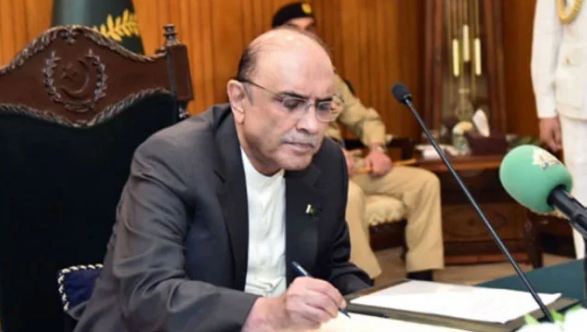ISLAMABAD: President Asif Ali Zardari on Sunday signed the madrassa registration bill into law ending the weeks-long friction with the Jamiat Ulema-e-Islam-Fazl (JUI-F).
Meanwhile, the National Assembly Secretariat has issued a gazette notification for the said law according to which seminaries would be registered as per the Societies Act.
Furthermore, the president has also issued an ordinance concerning amendments to the Societies Registration Act 2024.
Play Video
As per the ordinance, applicable only to the Islamabad’s jurisdiction, madrassas will have the discretion to register either with the education ministry or the industries ministry.
The development follows the federal cabinet’s Friday’s approval of the tweaks to the Societies Registration Act 1860 after the government and the JUI-F resolved their differences.
Prime Minister Shehbaz Sharif had met JUI-F chief Maulana Fazlur Rehman wherein the former reportedly “accepted all demands of the Ittehad Tanzeemat-e-Madaris Deenia (ITMD)” regarding the bill.
The disputed madrassa bill, which has already been passed by both houses of parliament, had become a bone of contention between the Fazl-led party and the government.
Its enactment was part of an agreement between the government and the religio-political party for supporting the 26th Amendment, Fazl had said previously.
The bill required President Zardari’s assent to become law after he returned the bill, citing legal objections.
The said legislation, now an Act, amends the existing procedure for registration of madrassas with the education ministry, stating that the institutions should be affiliated with the industries ministry instead.
President’s objections
Previously, the president had reportedly raised eight objections over the-then bill regarding seminaries’ registration.
President Zardari, the sources had said, expressed fear that if the madrassa bill turns into a law, seminaries will be registered under the Societies Act, which may lead to the imposition of Financial Action Task Force (FATF), Generalised Scheme of Preferences Plus (GSP+), and other sanctions on the country.
He highlighted a potential conflict of interest arising from the registration process and expressed concerns about potential negative consequences for Pakistan’s international standing and internal stability.
According to the objections, the registration of religious seminaries under the law would lead to the spread of sectarianism and the establishment of many seminaries in the same society would lead to deterioration of the law and order situation. The president objected that there was a contradiction in the definition of madrassa in various provisions of the bill.
He objected that by registering madrassas as societies, they could be used for purposes other than education; there was a contradiction in the definition of madrassas in various clauses of the bill.
The registration of madrassas in the society would lead to a conflict of interest and such a conflict of interest would also lead to international criticism, while the approval of the bill could lead to a change in the FATF and other international organisations’ opinions and ratings of Pakistan, the objection by the president said.
The president suggested to the members of the assembly that international issues should be taken into account while drafting a bill related to madrassas.

















